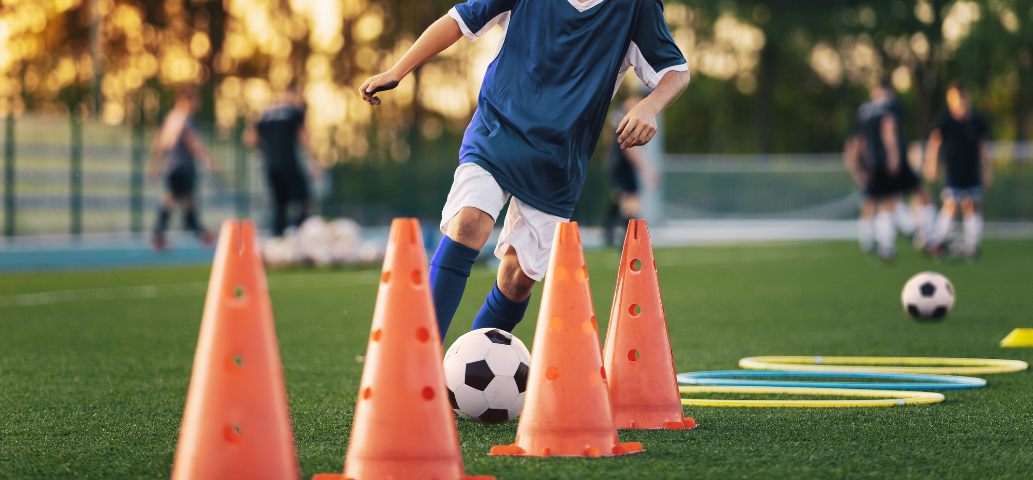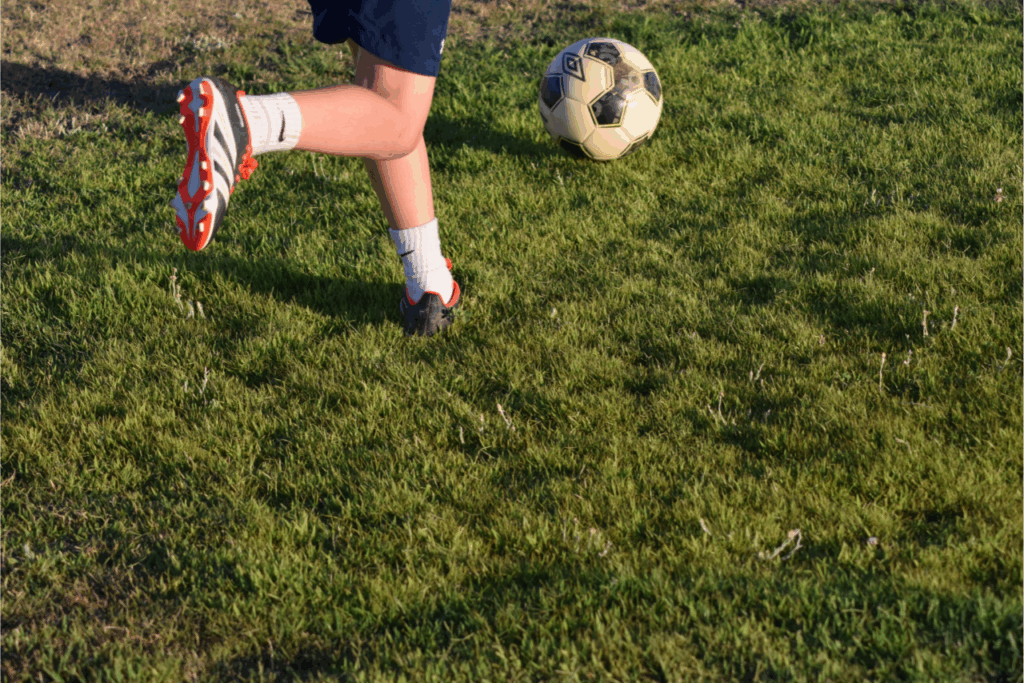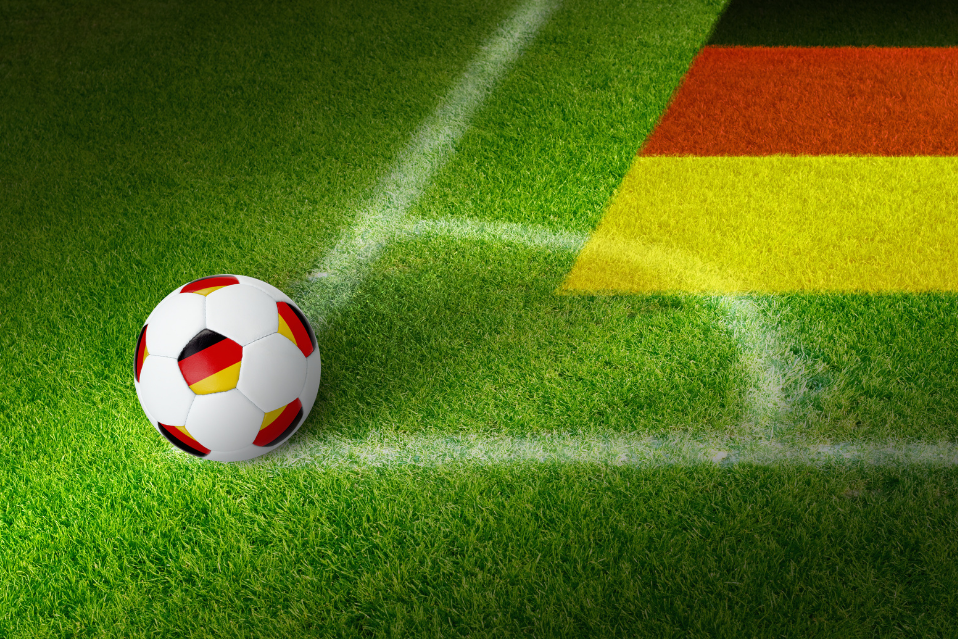Youth Soccer Fundamentals: The German Way to Long-Term Player Development
Germany’s dominance in world soccer didn’t happen by accident. From their 2014 World Cup triumph to consistently producing world-class talent, German soccer success stems from one core principle: youth soccer fundamentals training must come before everything else. This systematic approach to player development has created generations of technically superior players who think the game at the highest level.
The German Philosophy: “Technik ist König” (Technique is King)

In German soccer culture, there’s an unwavering belief that youth soccer fundamentals form the bedrock of all future success. The German Football Association (DFB) mandates that players spend the majority of their training time on technical skills until age 14. This isn’t just preference—it’s proven methodology that has revolutionized how the world views youth soccer.
The Four Pillars of German Youth Development
German coaches focus on four essential fundamentals in youth soccer:
1. Ball Mastery (Ballgefühl) Every German youth player develops an intimate relationship with the ball through thousands of touches. This isn’t casual juggling—it’s structured training of fundamentals that creates players who can control any pass, trap any ball, and manipulate the ball instinctively under pressure.
2. Both-Foot Proficiency (Beidfüßigkeit)
German players use both feet equally because their training demands it from day one. Two-footed players are unpredictable, versatile, and valuable at every level of the game.
3. Passing Precision (Passspiel) The famous German passing game begins with youth players who can deliver the ball accurately over any distance with either foot. This fundamental skill separates good players from great ones.
4. Spatial Awareness (Spielintelligenz) Germany develops players who understand positioning, timing, and decision-making. These cognitive skills are taught alongside technical abilities from the earliest ages.
Why German Youth Soccer Training Works
Scientific Approach to Skill Acquisition
German coaches understand that motor skills develop optimally between ages 8-12. This “golden age of learning” is when soccer fundamentals become permanently embedded in a player’s muscle memory. Miss this window, and players struggle to reach their potential later.
Research from German sports institutes proves that players who master youth soccer fundamentals during youth development continue improving throughout their careers, while those who skip this phase plateau early.
Long-Term Athletic Development Over Short-Term Results
German clubs prioritize individual youth soccer training over winning youth tournaments. This patient approach produces players who peak in their twenties, not their early teens. The 2014 World Cup squad exemplified this philosophy—technically perfect players who could execute under the highest pressure.
Systematic Progression Through Age Groups
German youth soccer training follows structured progressions:
From Ages 6-8 (F-Junioren): Pure fun with ball familiarization through play-based learning
Ages 9-10 (E-Junioren): Introduction to basic soccer fundamentals through small-sided games
From Ages 11-12 (D-Junioren): Intensive soccer fundamentals training with both feet
Ages 13-14 (C-Junioren): Refinement of technique while introducing tactical concepts
From Ages 15+ (B/A-Junioren): Advanced applications of mastered fundamentals
Essential Youth Soccer Fundamentals Every Player Must Master
Technical Fundamentals
First Touch Excellence German players receive the ball cleanly because their fundamentals training emphasizes controlling every type of pass—driven balls, lofted passes, balls coming from behind. This skill alone separates recreational players from serious competitors.
Passing Accuracy Under Pressure The ability to deliver precise passes while being pressured is what makes German midfielders so effective. This youth soccer fundamental requires thousands of repetitions in progressively challenging situations.
Shooting Technique German strikers score because they’ve mastered shooting mechanics through dedicated and targeted training. Proper technique generates power and accuracy that pure athleticism cannot match.
1v1 Skills Both attacking and defending in 1v1 situations are crucial youth soccer fundamentals. German players excel in these moments because they’ve practiced these skills extensively during youth development.
Cognitive Fundamentals
Game Intelligence German youth soccer fundamentals training develops players who read the game quickly and make smart decisions. This mental aspect of the game often determines success at higher levels.
Positioning Awareness Understanding where to be and when to be there is a fundamental skill that German coaches prioritize from early ages.
Implementing German Youth Soccer Fundamentals Training

Quality Over Quantity in Practice
German coaches prefer shorter, high-intensity youth soccer fundamentals training sessions over long, unfocused practices. Every touch, every pass, every movement has purpose and proper technique.
Small-Sided Games for Skill Development
Most soccer fundamentals are developed through small-sided games rather than traditional drills. These games provide more touches, more decisions, and more fun while developing essential skills.
Individual Technical Training
German players supplement team training with individual youth soccer fundamentals work. This personal commitment to technical excellence separates dedicated players from the rest.
Common Mistakes in Youth Soccer Fundamentals Training
Rushing to Advanced Tactics
Many youth programs introduce complex formations and strategies before players have mastered basic youth soccer fundamentals. This approach creates tactically aware players who lack the technical skills to execute their decisions.
Overemphasizing Physical Development
While fitness matters, German philosophy proves that youth soccer fundamentals training should dominate development time until players reach their mid-teens.
Neglecting Weak Foot Development
Players who avoid their weak foot during youth soccer fundamentals training become predictable and limited as they advance to higher levels.
Measuring Success in Youth Soccer Fundamentals
German coaches evaluate youth soccer players through specific, measurable criteria:
- Clean first touches under pressure
- Passing accuracy with both feet over various distances
- Ball control in tight spaces
- 1v1 success rates both attacking and defending
- Decision-making speed and accuracy
The Long-Term Benefits of Proper Youth Soccer Fundamentals Training
Technical Mastery Enables Creativity
Players with solid youth soccer fundamentals have the freedom to be creative because they don’t have to think about basic skills. Their technique becomes automatic, allowing their minds to focus on higher-level aspects of the game.
Confidence Under Pressure
German players perform in crucial moments because their soccer fundamentals are so ingrained that pressure doesn’t affect their execution. This mental strength comes directly from technical mastery.
Versatility Across Positions
Players with complete youth soccer fundamentals can adapt to different positions and roles throughout their careers. This versatility makes them more valuable and extends their playing longevity.
Making Youth Soccer Fundamentals Training Engaging
Game-Based Learning
German coaches embed fundamentals training within enjoyable, competitive games that maintain player interest while developing skills.
Progressive Challenges
Skills are introduced simply and gradually made more complex, ensuring players master each level before advancing.
Individual Goal Setting
Players set personal targets for youth soccer improvement, creating internal motivation for technical development.
Conclusion: Building Champions Through Youth Soccer Fundamentals

The German approach to youth soccer has proven that technical mastery during youth development creates better players, smarter players, and more successful players. While other countries chase short-term wins and physical development, Germany continues producing technically superior players who dominate at the highest levels.
Every touch matters. As well as every pass counts and every moment spent on soccer fundamentals during the crucial developmental years pays dividends throughout a player’s career. The German way isn’t just about producing professional players—it’s about creating complete footballers who understand and love the beautiful game.
Start with the basics, master the fundamentals, and watch as young players develop into the technically gifted, intelligent players the game demands. This is the German way, and it works.
Ready to put these fundamentals into practice? Having the right equipment supports proper skill development. While technique comes first in the German approach, quality gear helps young players train effectively and build confidence. Check out our comprehensive guide to choosing the best soccer cleats for kids to ensure your young player has the foundation gear needed for fundamental skill development. Remember: great fundamentals paired with proper equipment create the ideal environment for long-term soccer success.

